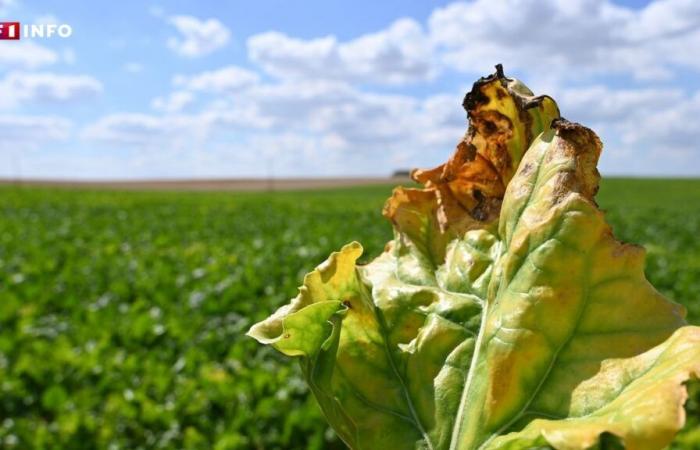
The Senate will study, as of Monday, a bill to re-authorize certain toxic pesticides for pollinators.
Prohibited products in France, but used elsewhere in Europe.
At the heart of the debate: acetamipride, used in particular on beets or hazelnuts.
Follow the full coverage
Our planet
The debate promises to be won over. From this Monday, January 27, the senators look at a bill (PPL) aimed at “lifting constraints to the exercise of the farmer profession” (new window). Taken by senators Laurent DUPLOMB (LR) and Franck Menonville (Centrist Union) The text plans to suspend or lighten several standards on megabassines (new window)animal welfare, protection of wetlands and pesticides.
Among the most striking provisions: a relaxation of legislation around neonicotinoids still authorized (new window) within the European Union. Toxic pesticides for pollinators prohibited in France, but still used in Germany, Italy, Poland, Estonia or Croatia. Particularly targeted by the two senators: the reintroduction of acetamipride, banned from French cultures from 2020, but authorized on the European market until 2033. This product is particularly used by producers of beet sugar (new window) and hazelnut.
-
Read
Maps of the most addicted to pesticides: find out how yours is exposed
“France has surtransposed” The European rules, said Laurent Dupumb at a press conference with FNSEA officials on the subject. “It is enough to come back to what our competitors know, if not, we have unfair competition”estimated the senator. An issue of food “sovereignty” for the elected official who fears to see “Whole sections of agricultural production” disappear, but which is widely debated.
Agriculture vs biodiversity?
In terms of producers, FNSEA majority unions and young farmers as well as rural coordination demand the return of acetamipride. They assure that professionals of hazelnuts and beets have seen in a few years their production drop, their cultures having become more fragile to harmful insects. “For hazelnuts, France authorizes a single pesticide, against eight in the rest of the EU and 240 in Türkiye”deplored to AFP Jérôme Bissières, vice-president of the National Association of Hazelnut Producers. According to him, “Half of the producers are on the verge of bankruptcy and some are ready to commit the irreparable”.
-Affirmations denying environmental NGOs. Future generations (new window) Ensures that in the hazelnut sector, 12 insecticide products are authorized, according to data from the catalog of EPHY phytopharmaceutical products. In addition, the association points to the danger of neonicotinoids, chemicals that “Attack the nervous system of insects, resulting in a decline in populations, including non-cable organisms”, like pollinating insects (new window)essential for biodiversity.
France Nature Environnement denounces a PPL for its part (new window) listed “A set of environmental regressions that jeopardize human health” While France is “Already the 2ᵉ larger consumers of pesticides and the second country which allows the most of pesticides in Europe”. Finally, the National Union of French Beekeeping (UNAF) (new window) point a “bill, dictated by certain agro-industrial, unacceptable interests”ensuring that she does not “Don't let it go”, recalling “The very high toxicity of neonicotinoid insecticides”.
Disagreements within the government
The question is so sensitive that it even divides into government. Contacted by TF1info, the Minister of Agriculture, Annie Genevard, did not wish to comment on the subject, but last November, when she was a member of the government of Michel Barnier, censored since, she had estimated that the authorized pesticides in Europe should “Being also in France”. “The debate will take place in the Parliament (…), this is a complicated question, but I resolutely place myself from the point of view of the producers, I do not want to leave the producers in the disarray, even the despair of the loss of their sectors “, had also said the minister.
A position against which the Minister of Ecological Transition Agnès Pannier-Runacher was raised which maintains her statements made last December, when she spoke against the reintroduction of neonicotinoids in French law. The Minister believes that this is a “False solution”while acetamipride is suspected of having an endocrine disruptor effect, of being a neurotoxic with development with a possibility of ending up in drinking water for infiltration.
His ministry assures TF1info that “To respond to the concerns of farmers, she made operational proposals at European level which go in a real direction of acceleration of the search for solutions to control unfair competition “.
Towards an accelerated parliamentary procedure?
It is therefore now up to parliamentarians to decide the question. Laurent Dupumb, he asked Matignon an accelerated procedure for his bill, which would limit the debates to a voting per chamber. If the text could be validated by the Senate, since it was co -signed by 192 elected representatives of the upper chamber – more than the absolute majority – it is in the National Assembly that the debates could reach out between the left and the right.
“In the Assembly, it will be difficult”, recognized the carrier of the PPL hoping that his text has “Infused in minds”. High discussions should be committed in the coming weeks when the government has not given its arbitration, in particular on the question of the re-authorization of acetamipride, a “Case” For Laurent Dupumb. For their part, environmental NGOs hope that the text will remain “Forgetting”.





